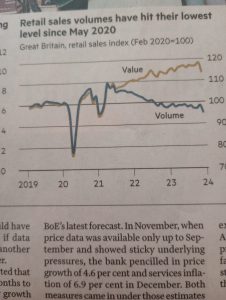How NOT to write about the markets: As a technical analyst, economist or media pundit
The title says ‘write’ but the suggestions and pointers in this article apply not only to print but also voice and video content.
First and foremost: don’t assume that rising prices are ‘good’ and falling ones ‘bad’. We are not dealing with George Orwell’s Animal Farm where four legs are good and two legs bad. Rising crude oil prices will obviously benefit OPEC members, but are a nightmare for those with a long drive to work. Foreign exchange only deals with ratios, not absolutes, so when Cable rallies the US dollar weakens. Which the driver is can be hard to untangle. FX dealers usually resort to ‘’more buyers than sellers’’ when questioned by the press. To this tricky stew add in the fact that everything tangible is priced in currencies.
Related to this remember that for every buyer there is a seller. Whatever the price move, half will have benefited in some way, the others not so. Likewise never boast about correct calls you have made, because many others will have missed the move and your words will stick in their throats.
In some markets it is just as easy to sell as it is to buy, like futures contracts and contracts for difference. On the sell side there will be producers hedging, but also an awful lot of people hoping to benefit from a fall in prices. How many potential first time home buyers would relish a fall in real estate prices?
When it comes to options, these too are easy to sell, but the risk profile is completely different to that of someone buying. The asymmetry is astoundi ng as the former accepts unlimited price change liability – as well as unlimited changes in implied volatility.
ng as the former accepts unlimited price change liability – as well as unlimited changes in implied volatility.
A second theme is: never assume that assets will hold their value; inflation is not a sticky toffee pudding but a vicious evil which wipes away savings, shrinks debt and destabilises society. In this vein do not think that a sudden sharp price move was unexpected; some might have seen it coming and have been manoeuvring for exactly this result. With this in mind, you should never fall into the trap of extrapolating trends in a straight line ad-nauseum. Investment returns vary tremendously over time and averaged return data can be exceedingly misleading.
Avoid short cuts, abbreviations and especially jargon that you are unfamiliar with; using market lingo the wrong way only exposes the shallowness of your grip on the subject. Avoid hyperbole, extreme adjectives and words merely trying to make the text more interesting. Calculate whether a price move was statistically significant before using strong language. Talking of which, if you’re involved on the global stage, remember that many readers have English as a second language. If possible, get someone to sub-edit your piece.
Fashion is fickle – and so are investment themes. Whether it’s index tracking, Exchange Traded Funds or the Magnificent Seven (as top US tech stocks are known today), they can easily fall foul of popular opinion. Then they are ’out’, maybe forever.
Last but not least: when you die you can’t take it with you.
Tags: Hyperbole, Innuendo, media, Vocabulary
The views and opinions expressed on the STA’s blog do not necessarily represent those of the Society of Technical Analysts (the “STA”), or of any officer, director or member of the STA. The STA makes no representations as to the accuracy, completeness, or reliability of any information on the blog or found by following any link on blog, and none of the STA, STA Administrative Services or any current or past executive board members are liable for any errors, omissions, or delays in this information or any losses, injuries, or damages arising from its display or use. None of the information on the STA’s blog constitutes investment advice.
Latest Posts
- Navigating the Market: Insights from Robin Griffiths and Ron William April 9, 2025
- Avoid Revenge Trading: The Key to Long-Term Trading Success March 31, 2025
- Mastering Relative Strength Portfolios: Key Takeaways from the March STA Meeting March 12, 2025
- Stay Disciplined, Stay Profitable February 26, 2025
- Understanding Price Gaps in Trending February 19, 2025




















Latest Comments